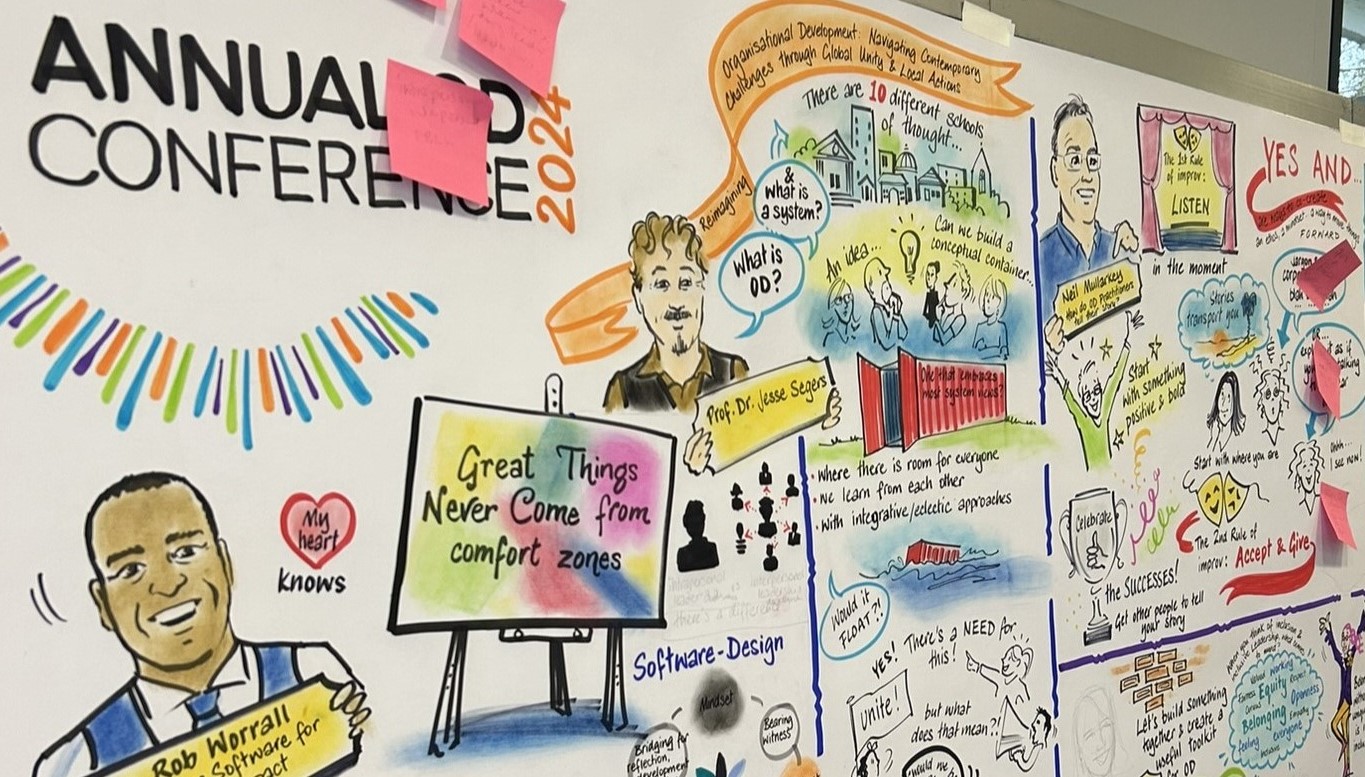Organisational Development (OD) is the work of facilitating organisational success, by aligning structural, cultural and strategic realities of work to respond to the needs of an ever-evolving business climate.
Go to our Organisational Development programmes and find the right one for you!
The Short Guide to Organisational Development
What is Organisational Development?
Organisational development (OD) is concerned with facilitating change in organisations through a holistic and humanistic approach that puts people at the heart of the process.
Here at Roffey Park, we define Organisational Development as the work of facilitating organisational success, by aligning structural, cultural and strategic realities of work to respond to the needs of an ever-evolving business climate.
At the heart of good organizational development is the deep connection between the best business processes and structures on the one hand, and the people working within the organization on the other. In short, it is to create great organisations!
There are significant differences between organisational development and ‘culture change’, ‘change management’ and ‘business transformation’. Find out more about the definition of OD here.
What is Organisational Development trying to fix?
To achieve high performance and competitive advantage, organisations are often in the midst of significant learning and change.
In traditional organisation and leadership theory, the inspirational, top-down vision for the organisation is supposedly created by a few and thrust upon the many.
Such change initiatives may result in a successful change of procedures and structures (the easier bit), but rarely trigger sustainable change in working methods, culture and organisational effectiveness which is at the root of real return on investment, profitability and long-term transformation. Organisational Development (OD) is an area of expertise which addresses this challenge with decades of internationally tried and tested research and practice, spanning thousands of professionals.
Key Characteristics of Organisational Development
Organization Development (OD) is the work of facilitating organisational success, by aligning structural, cultural and strategic realities of work to respond to the needs of an ever-evolving business climate.
Characteristics of OD include:
- Changes to the structure, culture, strategy and processes of an individual job through to an entire organisation.
- The application of behavioural science knowledge and practice to facilitate transformation within an organisation.
- The improvement of organisational effectiveness by involving members of the organisation in understanding the challenge whilst enabling in them new skills, knowledge and ways of thinking.
- The promotion of high productivity, performance, quality products, financial performance and continuous improvement.
- The facilitation of change in a flexible, adaptive and often participative way.
- Sustainability, so consistent change in the right direction continues beyond the life of the initial change initiative.
OD also operates from a particular set of values that shape how the work is done. Key to this is the valuing of human potential and therefore the importance of understanding the systemic challenges from a range of stakeholders and to then engage those stakeholders directly in shaping the change, partly so that change is well conceived of but also so that, through broad ownership, its chance of being understood and implemented are maximised.
The History of Organisational Development

The roots of Organisational Development can be found in the USA, in the work of Kurt Lewin (1898-1947). Seen as the founding father of OD, he founded the ‘Research Center for Group Dynamics’ at MIT, experimented with collaborative change processes, and proposed the first concepts of group dynamics and action research, which underpin OD. Lewin found that using participative methods in small groups led to positive changes in attitude and greater commitment from the people in organisations. A parallel interest in what happens in individuals and groups in work also arose in Europe and the UK over a similar period, with Roffey Park founded in 1946 and The Tavistock Institute in 1947.
 Abraham Maslow (1908-1970), a psychology professor most famous for his ‘hierarchy of needs’, and another important figure in the history of Organisational Development, believed that when an individual’s needs were met, it led to ‘self-actualisation’. When an organisation was open, and the individual’s contributions were recognised, this was more likely to occur. Other theorists advocated participation as a means of motivating employees and achieving a greater performance, and leadership styles that were democratic and involving were shown to lead to better organisational performance and employee satisfaction.
Abraham Maslow (1908-1970), a psychology professor most famous for his ‘hierarchy of needs’, and another important figure in the history of Organisational Development, believed that when an individual’s needs were met, it led to ‘self-actualisation’. When an organisation was open, and the individual’s contributions were recognised, this was more likely to occur. Other theorists advocated participation as a means of motivating employees and achieving a greater performance, and leadership styles that were democratic and involving were shown to lead to better organisational performance and employee satisfaction.

In 1969, Warren Bennis introduced the concept of organisational culture, identifying that OD is ‘a complex educational strategy intended to change beliefs, attitudes, values, and structures of organizations so that they can better adapt to new technologies, markets, and challenges, and the dizzying rate of change itself’.

Edgar Schein at the start of the 1980’s, developed this idea of ‘organisational culture’, using metaphors of the cultural iceberg and lily pad. With the iceberg, Schein shows how difficult it is to see what underlies the behaviours of an organisation, as most is hidden below the surface. With his lily pad analogy, he proposes that we can easily see the flowers on the water (the behaviours explicit in an organisation), however unless we drop down to the stems (the values supporting those behaviours) and then the partly hidden roots (the assumptions behind these values and behaviours), we cannot truly understand what drives the organisation’s actions and thoughts of the people within the organisation.
Behavioural sciences, including anthropology, economics, psychology, and sociology have all had their impact in the evolution of Organisational Development, and as a result, in 2002, Toby Egan identified there had been 27 definitions of OD between the period 1969 and 2003.
Why is Organisational Development useful?
If you’re involved in any way in helping an organisation to move forwards and evolve, then it’s imperative to do this with eyes wide open to the big picture. Organisational Development not only addresses what may be more obvious changes that are needed (structural, business objectives, product development, strategic direction, stakeholder requirements, etc), but also the hidden aspects of organisational culture and details how to utilise or change these for effective, sustainable, long-term success which brings the organisation along with you.
The Benefits of Organisational Development
Organisational Development is adaptive, flexible and evolving. It puts people at the heart of change, emphasises creativity and innovation, and positively affects the bottom line.
- OD creates a continuous cycle of improvement, from strategy, through to implementation, evaluation and further change.
- OD increases communication across all levels of the organisation, aligning employees to shared values and manifesting change from employee feedback
- OD increases innovation through employee development and engagement and an effective analysis of the market.
- OD increases profit by improved productivity and creativity, reducing costs, minimising staff turnover and creating a culture of openness and adaptive and ongoing change
Your OD needs
To discuss your organisational development requirements in more detail, please contact us by email, or phone on 01293 851644
How Roffey Park helps your organisation benefit from Organisational Development
As more and more practitioners and clients are adopting the values and applying the principles of OD, we are working with a number of those organisations to build their capacity and confidence in taking an OD perspective and developing OD expertise.
We can achieve this for your organisation through:
OD Research
You can commission Roffey Park to conduct research specific to your organisation on the theme of organisational development, to help build an organisation-wide OD strategy unique to your organisation. We also have a wide range of OD Research Papers
OD Consulting
Either through consulting alongside your own internal consultants or through taking the brief directly, we work with a range of businesses to do OD work directly. This may take many forms from job and team redesign, to wider organisation redesign but more often by looking at engagement and strategy processes, large group events and dialogue processes as means to supporting culture change alongside leadership development work.
Open programmes in OD
Our OD training and development programmes run regularly throughout the year in open format – where you attend as an individual, forming a group with like-minded people from different organisations. We offer a full pathway of programmes from the essentials of OD through to our online Masters in Organisational Development qualification.
Customised programmes in OD
Almost all of the programmes delivered as residential open programmes at Roffey Park (below) can also be delivered in the same format in your organisation, anywhere in the world or as Custom OD Programmes. The benefit here is that there is greater opportunity to get into the specifics of your organisation. Training is scalable to reach different groups, divisions or continents.
Training & Development Programmes related to Organisational Development (OD)
MSc in People and Organisational Development
The MSc in People and Organisational Development is an innovative two-year, part-time Masters Qualification validated by the University of Sussex. This OD qualification programme deepens your theoretical knowledge and practical ability to transform organisations in a holistic way which brings the people along with you. It will increase your confidence, your personal impact, effectiveness and credibility in your role either inside an organisation or as an external consultant or change management practitioner. Roffey Park’s unique academic approach will empower you to pursue your own study path through the programme to tailor the outcomes to your current and future needs. Find out more about the MSc
OD Practitioner Programme
This is a highly practical and in-depth look into OD. It will equip you with a core understanding of what OD is. Improve your skills and provide you with greater awareness of your self and group process. We achieve this by bringing theory to life through practice – using your real world situations and experiences as the starting point for deep learning. Find out more about the OD Practitioners Programme
Practical Facilitation Skills
This programme is fundamentally about learning to be a cutting-edge facilitator. The connection with OD comes through in our global, holistic approach which is embedded in best-practice OD. That means we’ll help you evolve into a facilitator who is adept at working with groups of all sizes, whilst also having a firm eye on the bigger picture. This 2-day programme is available here at Roffey Park UK, in our Singapore office and in your organisation anywhere in the world. Find out more about the Practical Facilitation Skills programme
Advanced Facilitation Skills
This is a deeper dive into facilitation which again encompasses the best of OD whilst allowing more time for the exploration of self. This programme is all about you, and how you interact with others as a facilitator in your organisation. The group you become a member of here on the course at Roffey Park becomes a test bed for your OD awareness and personal facilitation skills. Find out more about the Advanced Facilitation Skills programme.
OD Case Studies at Roffey Park
Examples of recent organisational development work include:
- Working with a FTSE 100 telecoms company to increase OD capacity and confidence at a senior HR professionals level by providing an OD qualification.
- Working with a Housing Association to support a culture change initiative following a series of mergers.
- OD consultancy with a large, multi-site organisation to explore the effectiveness of their different structures and ways of working, resulting in some specific interventions to improve efficiency.
- Coaching with a large national charity to support the development of their OD strategy.





